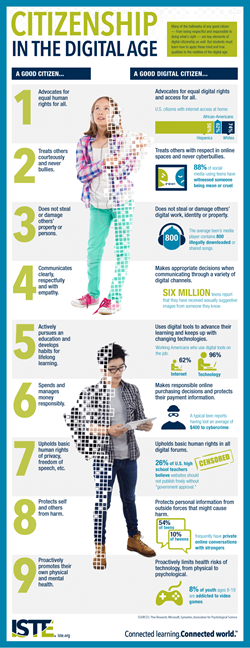Digital Citizenship - The 9 Elements of Digital Citizenship

Reflection Journal
Digital citizenship is a necessity in this day and age. For years now technology has become part of our everyday lives. Respect and responsibility are things we teach in person and it is more important than ever to teach respectfulness and responsibility in the digital world. Let's face it, we can't change it... technology has changed our lives forever, will be around forever, and will constantly be changing forever. It is crucial to teach and model digital citizenship to all individuals using digital media.
Over the last half century there have been several technology breakthroughs that have changed our lives for the better. From organ transplants to robots and artificial intelligence; to nuclear power, cellphones, personal computers, digital media, and the internet. We have almost instant information access, connections, and collaborative learning at our figure tips. It's important to remember with anything, there are pros and cons. Although there are so many good things about technology it also gives easy access to identity theft, sexting, cyberbullying, plagiarism, and more. With this in mind, it is more than every important to educate others and teach our children how to be digital citizens in this ever-changing world.
Dr. Jason Ohler suggests, "We must develop an ethical core that can guide us in areas of experience that are in many ways unfamiliar," (Ohler, 2010). Author Daniel Prensky believes, "... installing ethical behavior ought to be our number one concern," (Presnsky, 2010). Even the U.S. Department of education states. "... students must be active, creative, knowledgeable, and ethical participants in our globally networked society," (Learning, 2010). The problem is few young people engage in ethical behavior online. I see it everyday at work and out in society. There are tons of communities to help teach digital citizenship in schools. Here in Michigan we have what is called CIPA, The Child Internet Protection Act that is required in all schools.
Mike Ribble describes nine different themes of digital citizenship, but even though they are all different they are interrelated. These themes include digital access, commerce, communication and collaboration, etiquette, fluency, health and welfare, law, rights and responsibility, and security and privacy (Ribble, 2015). All nine of these themes fit into three categories of being safe, savvy, and social. Digital citizenship is about protecting yourself and others, educating yourself and others, and respecting yourself and others. It is important to remember, remind others, and teach leading and assisting others in building positive digital experiences. We must recognize our actions have consequences to others and participate in a manner for the common good. Just because we are behind a screen and may not see others, other individuals are right on the other side of the screen and they have thoughts and feelings just like us.
We cannot get around it, technology is all around us. It is more important now than every to be educated in being safe, respectful, and responsible online. Digital citizenship is key in our society. Even though we do not always see people on social media, it is important to remember the golden rule. Think about how you want to be treated and talked to and then do the same to others. This week's readings and supplemental material have reminded me of how important it is to teach digital citizenship to all individuals using digital media. As an educator I have a responsibility to educate my students, their families, and staff in being safe, savvy, and social.
Here are 5 Resources to Help Other Educators
Common Sense Media
https://www.commonsense.org/education/digital-citizenship
Edutopia
https://www.edutopia.org/topic/digital-citizenship
ISTE
https://www.iste.org/explore/9-resources-teaching-digital-citizenship
NetRef
https://net-ref.com/blog-5-creative-ways-to-teach-digital-citizenship/
America College of Education
https://www.ace.edu/blog/post/2019/01/08/digital-citizenship-what-it-means-how-to-teach-it-and-the-resources-you-need
Learning. (2010). Retrieved November 16, 2020, from https://tech.ed.gov/netp/learning/
Ohler, J. (2010). Digital Community, Digital Citizen. Corwin Press.
https://dx.doi.org/10.4135/9781452219448
Prensky, M. (2010). Teaching Digital Natives: Partnering for Real Learning. Thousand Oaks, CA: Corwin.
Ribble, M. (2015). Digital citizenship in schools: Nine elements all students should know. (3rd ed.).
Eugene, OR: International Society for Technology.